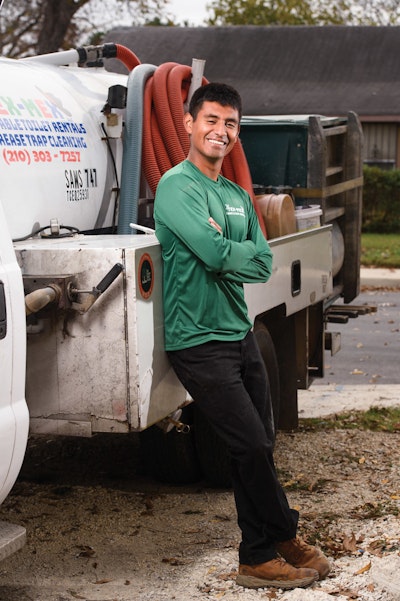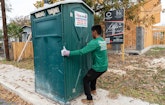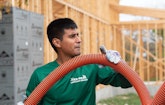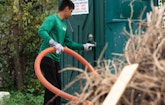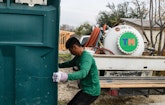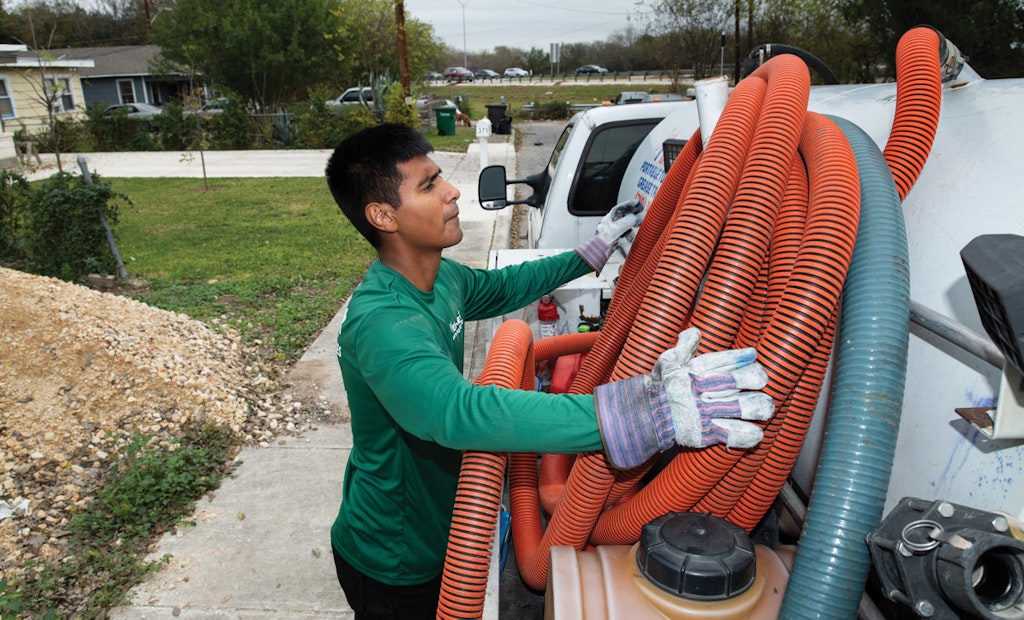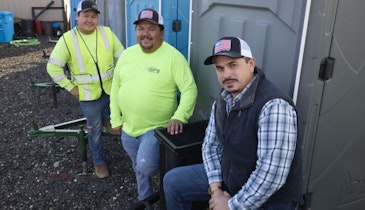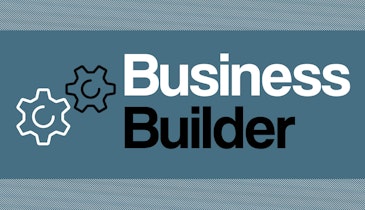Interested in Business & Technology ?
Get Business & Technology articles, news and videos right in your inbox! Sign up now.
Business & Technology + Get AlertsAfter obtaining a degree in biomedical engineering, Mario Hernandez got a job at a primate research center. He found the work interesting but never felt it was his true calling. He had grown up helping his parents, Mario Hernandez and Mercedes Reyes, in their septic service business and found himself circling back to the wastewater industry.
By 2020, he was working at a bathroom supply company. But when he noticed an unfilled need in the portable restroom market in San Antonio, he saw an opportunity to go into business for himself. “I felt I could achieve more that way — not by myself but with my ideas,” he says. “I felt my own ideas could drive me in the direction I want to take my life.”
He kept his day job but, with the support of his wife Hayli Phillips, an intergovernmental affairs manager for the county river authority, in August 2020 he registered with the state as Tex-Mex Toilets, the name being a combination of their two heritages.
Over the next few months he did some research, finalized plans, bought portable restrooms and a vacuum truck, and began advertising. His target market was Mexican immigrant construction companies which he felt were being underserved. Being from Mexico himself, having moved to Texas as a child, he spoke Spanish and knew their customs and how they liked to do business.
He picked up his first customer in December 2020. A year later, he owned 70 units, the majority from PolyJohn, and three trucks and had left his job. He believes his success was not only a result of his own knowledge, ambition and hard work, but also the inspiration of his parents from whom he gained industry knowledge, and the encouragement of his wife, without which he says he could not have done it.
ON A SHOESTRING
Although Hernandez had a good job, he wanted to start his business with minimal investment. “I just didn’t want to break the bank,” he says. “I wanted to see what was the most cost-efficient way I could do it.” One way was sourcing used equipment and using social media to find customers and employees.
He found a 2002 Ford F-350 and then a 2015 Satellite Vacuum Trucks 600-gallon waste/300-gallon freshwater steel tank with a Condé (Westmoor Ltd.) pump. Although they were bargains, he did have to do some tweaking. “It didn’t run because that tank is driven by a hydraulic pump and the F-350 automatic does not have a PTO engagement system so I had to figure it out,” he says.
“That was a crazy adventure.” He built his own hauling trailer paired with a Ford F-150.
Initially he bought 13 used portable restrooms (one came with a surprise snake). They were different brands, many in poor condition but he cleaned and repaired them. So far they have been satisfactory for his construction customers.
His radio ad through a free community marketplace on a local radio station brought him his first customer.
CONNECTING WITH THE CUSTOMER
Hernandez knows how the immigrant construction companies want to do business — straightforward, no red tape, low cost. He’s flexible and does not require contracts, deposits or insurance. “I take a higher risk by not asking for all of that but I just try to do it the Mexican way,” he says. “I understand their needs. They like that.”
He has had very few problems. He may lose out on a weekend rental now and then when a customer cancels without a deposit, but it’s made up for in good customer relations. “Things happen and so they need to cancel,” he says. “But the next time your party comes through you’re going to be happy to rent from me because I didn’t take your $50 deposit.”
He did choose to register his business as a limited liability corporation (LLC) to avoid personal liability. “I know that accidents happen every single day,” he says.
KEEPING UP WITH DEMAND
Once Hernandez had his first customer, word spread quickly. Then customers started requesting units for their get-togethers, weddings and quinceañeras (a Mexican tradition to celebrate a girl’s 15th birthday). Fortunately, among his collection of units he had 10 or 12 in good condition and even a couple of flush units.
Existing customers also asked for septic services. In October 2021 his parents gave him one of their old vacuum trucks, a 1985 International with a 1,400-gallon steel tank and Fruitland pump.
The challenge for Hernandez wasn’t finding work but finding time. “Time management has been the hardest thing. When everything exploded I just really couldn’t do everything. I finally left my job in June and that solved my main problem.”
FINDING HELP
Before he left his job, Hernandez was working 16-hour days, seven days a week. He knew he had to have help, but it was tough. “It’s really hard to find someone who wants to be in waste,” he says. “And every company is struggling for employees.” Finally, Hayli heard from a friend about an ambulance driver, Michael Collins, looking for side work. “I never thought he’d want to get into this but since day one he has exceeded (expectations),” Hernandez says. Unfortunately, Collins will soon leave to train as a physician assistant.
But Hernandez hopes to have several people onboard soon. He’s purchased another vacuum truck, a 1999 Ford F-450 built out by Liquid Waste Industries with a 300-gallon waste/100-gallon freshwater steel tank and Jurop pump.
FINAL THOUGHTS
Regrets: Hernandez says it might have been better to go the financing route rather than pay cash for everything. “I think if I had done that, it would have been working smarter rather than harder.”
Surprises: “I didn’t think it would go as fast as it did,” he says. “I thought it was going to take years. But the market is so good and if you know how to target it right, there are endless possibilities.”
Plans: The future includes adding septic work, buying hand-wash stations and servicing grease traps. And Hernandez says he knows he’s going to have to welcome technology into his life. “Right now I’m kind of against it but I know when the company grows more we’re going to have to do things different.” His website was hacked, so he gave up the domain name and has mixed feelings about trying again — Facebook seems sufficient but a website provides more credibility.
Advice: “Either you really love this business — and are willing to put in the hours, the effort, learn everything you need to learn, go the extra mile, without doubting yourself — or this is not for you.”
Best thing about it: “I feel I do something that maybe doesn’t change the world, but it changed my world. I have a lot of satisfaction in what I do.”
The rest of 2022 promises to be busy. Not only is his business thriving but he and Hayli will soon be first-time parents.
